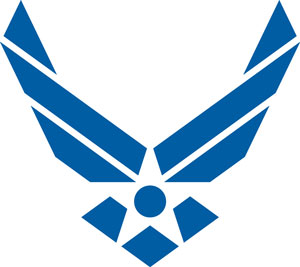If I join Air Force ROTC, does that mean I am joining the military?
No. If you received a four-year scholarship from high school, then the first year of college is paid for, and you can quit at the end of your first year with no obligation. If you got a three-year scholarship from high school or college then you are not committed to the Air Force until you accept your scholarship (usually in the fall of your sophomore year). If you did not get any scholarship, then you are not committed to the Air Force until you start your junior year of college. With Air Force ROTC, we provide you with lots of opportunities to see what the Air Force is about before signing up. And while you are waiting, you are getting college out of the way and having a lot of fun.
Frequently Asked Questions
What Is The Difference Between Junior ROTC In High School And ROTC In College?
The mission of the high school Junior ROTC program is to build better citizens for America. The mission of the college ROTC program is to produce officers to serve in leadership roles for the Air Force. Students joining our program in college do NOT need to have previous JROTC experience.
Do I Have To Join Air Force ROTC As A First year?
No. Any student (undergraduate or graduate) with three or more years remaining is eligible. So if you are a second-semester first year student, a sophomore or otherwise and have at least three years remaining in your undergraduate studies, you are likely able to join the ROTC program. If you have fewer than three years remaining, please contact our detachment to look into possible options for AFROTC participation.
Can I Enroll If I Did Not Take Air Force ROTC As A First year?
Yes. You can enroll in Aerospace Studies 101 and Aerospace Studies 201 and be what we call dual enrolled - ie concurrently enrolled.
Can I Attend Air Force ROTC Without A Scholarship?
Yes, you can. Many of our students do not start with a scholarship, but earn one eventually. Still, at any given time, about 80% of our students receive financial assistance.
I have served time in the military, would I still need to complete the first year and sophomore level AFROTC courses (GMC classes)?
If you have served in the military (active duty, guard, reserve) in any branch we can grant you credit for your previous experience and waive a portion or all of the GMC classes - please contact the detachment for specific information regarding this. Additionally, students who participated in JROTC (any branch) or CAP, attended a Military JROTC HS, or participated in another Senior ROTC program (Army, Navy, Air Force) may be able to receive credit as well.
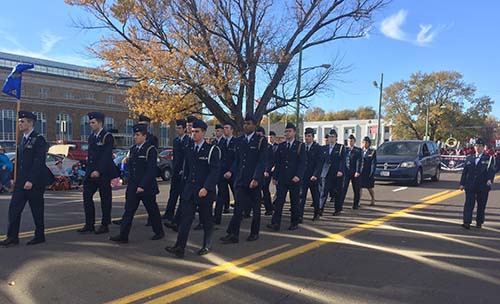
Definitely not! The fact that a cadet may have an Air Force ROTC scholarship has no bearing on an Air Force career. Nor does it make any difference while in the Air Force ROTC program.
Are There Any Restrictions As To What Students Select As Their Academic Major?
None at all. In fact, we encourage you to take a curriculum you are interested in and in which you have the capability to do well. Our main academic concern is that you maintain a Grade Point Average (GPA) above 2.5 and attain your degree in the time period planned. The GPA requirements are different if you are applying for a scholarship, or are currently on a scholarship.
Can I Pursue Graduate Education After I Am Commissioned?
The Air Force is education-oriented and financially supports graduate studies. You can apply for the Air Force Institute of Technology to earn an advanced degree on full scholarship. Additionally, most bases have graduate college programs, and you may apply for the tuition assistance program that pays 100% of the tuition cost.
How Often Can I Take The Air Force Officer Qualifying Test (AFOQT)?
The test is offered by the detachment (at no cost) several times during the fall and spring and can be taken a maximum of two times with at least six months between tests.
If I Take Air Force ROTC Classes, Am I Committed To Military Or Government Service Once I Join?
There is no service commitment for students who take our classes with no intention of becoming an Air Force officer. For these types of students, it is only another class. If you are interested in becoming an officer, there is no service commitment during the first two years of the Air Force ROTC program (the General Military Course) unless you have an Air Force ROTC scholarship. If you decide to stay and join the Professional Officer Course (POC); the last two years of the program), you will then officially contract with the Air Force. Students who successfully complete our program incur a 4-year service obligation post-graduation. For Air Force ROTC scholarship students, you are obligated once you have activated the scholarship and have entered your sophomore year. Regardless of when you officially contract with the Air Force, all students who successfully complete AFROTC and earn a commission will incur a 4-year service obligation post-grad.
Is there an age limit for participating in AFROTC?
The maximum age limit for commissioning is 42. However, if you are interested in competing for the pilot, combat systems officer, or air battle manager career fields you must be able to complete your bachelors degree and be commissioned through Air Force ROTC before you are 29 years old.
Is The Four-Year Program More Advantageous For Students?
Yes, for the following reasons:
- It gives you more time to participate in the Air Force ROTC program without obligation, to gain experience and to decide whether you want to continue your path to becoming an Air Force Officer
- You'll have more opportunities to compete for scholarships if eligible.
- You'll have more opportunities to build and cultivate your leadership and teamwork skills, plus take advantage of optional summer programs & internships
Do I Have To Wear A Uniform To Class Every Day?
The only time cadets are required to wear their uniform is on Thursdays for AFROTC class.
How Much Time Do I Have To Spend With Air Force ROTC Each Week?
The only required time is during your Air Force ROTC classes, Leadership Lab and physical fitness training. (This equates to approximately five hours per week for first year and sophomores, seven hours per week for juniors and seniors.)
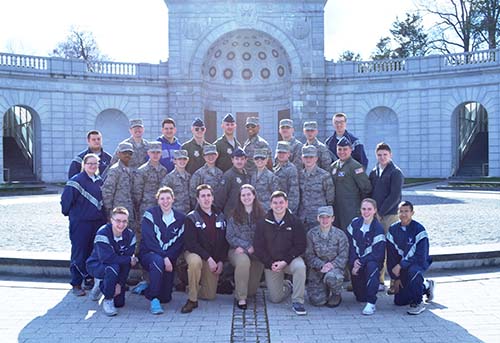
How Are New Cadets Treated?
Very well. Many detachments assign cadet mentors to new students. They can help students find classes, get textbooks, learn to wear the uniform correctly, meet other cadets and guide them through their first year of college and AFROTC. The detachment staff and cadet wing are responsible for helping new cadets get acquainted with the program and their fellow cadets. We also have tutoring programs and other forms of assistance. Hazing or other forms of maltreatment are prohibited. You will find the cadet staff and detachment staff are concerned about the health, safety and progress of the cadets in the program.
Can I Participate In Intercollegiate Athletics While A Member Of The Air Force ROTC Program?
Yes. Generally, extracurricular campus activities and Air Force ROTC are perfectly compatible – as long as you do not overload yourself with extracurricular activities.
What Is The Commitment To The Air Force Upon Graduation?
Most officers have a four-year commitment post-graduation. For pilots it is 10 years after pilot training, and six years for combat systems officers after training. Air Battle Managers have a six-year commitment.
When Do I Know What Job I Will Be Doing For The Air Force As An Officer?
You will compete in a selection process. The factors to be used will include your Air Force Officer Qualifying Test (AFOQT) scores, your field training performance rating, your Grade Point Average (GPA), your academic major, your Physical Fitness Test (PFT) score and the Detachment Commander 's rating. You will know your specific Air Force career field approximately 6 – 8 months before you graduate and commission.
Do I Have To Become A Pilot Or Combat Systems Officer?
No. The vast majority of Air Force jobs do not involve flying at all. For almost every civilian out in the workforce, there is an Air Force officer counterpart performing a similar job.
Must A Student Go On Active Duty In The Air Force Immediately Following Graduation And Commissioning?
Not necessarily. You may request an educational delay if you desire to attend graduate school at your own expense before going on active duty. If approved, the Air Force will postpone your active-duty tour. Delays are routinely provided if you select to attend dental or medical school. Scholarships also exist for students accepted to medical school.
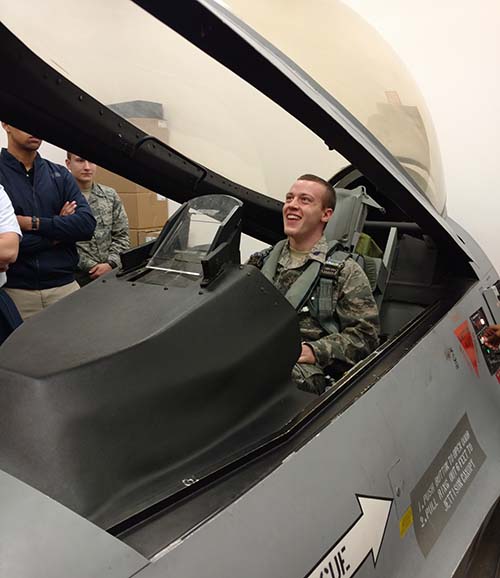
I Do Not Have 20/20 Vision. Can I Still Fly?
Probably - It depends on your condition. You will need to speak to a staff member.
Do I Have To Major In Aeronautical Science To Become A Pilot Or Combat Systems Officer?
No. Your academic major plays a minor role in pilot and combat systems officer selection. You can major in any degree program and compete to receive a pilot or combat systems officer slot in Air Force ROTC.
What Are The Age Limits For A Cadet To Compete For A Pilot Or Combat Systems Officer Position?
To compete for the pilot or combat systems officer categories, you must be able to complete your bachelors degree and be commissioned through Air Force ROTC before you are 29 years old.

If I Apply For The Scholarship, Am I Obligated To The Air Force In Any Way?
No. Applying for an Air Force ROTC scholarship does not obligate you in any way. Four-year scholarship recipients do not incur any obligation until the start of their sophomore year in college.
When And How Will I Be Notified If I Have Been Offered A Scholarship?
If offered an Air Force ROTC scholarship, you will be notified via email after the scholarship selection boards meet.
What Kind Of Scholarships Does Air Force ROTC Offer?
Available types of Air Force ROTC scholarships can be found on the AFROTC Scholarships page external website.
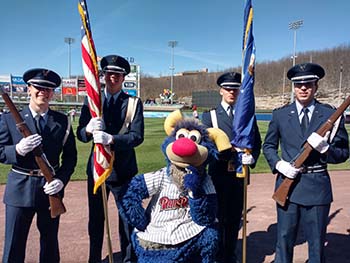
What Are The Weight And Fitness Standards for Scholarship Consideration?
To apply for the scholarship, you must complete the Physical Fitness Assessment (PFA). For instructions, refer to your online application.
If you are offered a scholarship, you must meet the Air Force Weight Standards prior to activating the scholarship.

